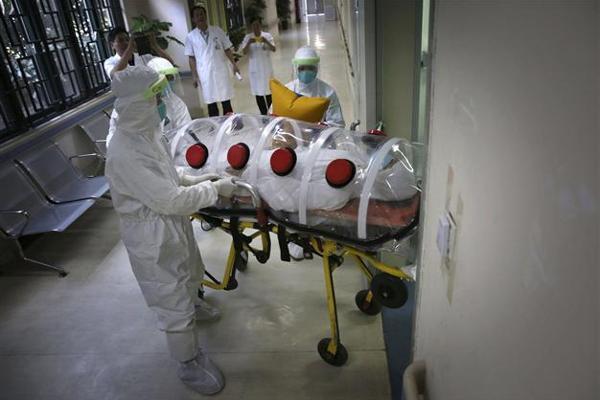World steps up Ebola action as fear mounts
GENEVA - Agence France-Presse


Medical personnel (back) take pictures with their mobile phones as health workers in protection suits transport a mock patient into a quarantine ward during a drill to demonstrate the procedures of handling Ebola victims, at a hospital in Guangzhou, Guangdong province October 16, 2014. REUTERS Photo
Western countries scrambled to review safety measures at airports and borders amid a mounting wave of fear that West Africa's Ebola outbreak will spread worldwide.As US lawmakers grilled officials over how an infected nurse was allowed to board a crowded flight, European officials promised a review of how passengers from Ebola-hit countries are screened.
US President Barack Obama authorized the Pentagon to send reservists to take part in a US mission to combat the Ebola epidemic.
The World Health Organisation (WHO) vowed to ramp up its efforts to help 15 African countries defend themselves against the virus, which has already killed around 4,500 people.
France and Spain placed several potential victims under observation and in Liberia, the worst hit country so far, the minister of transport placed herself in quarantine after her driver died.
EU health commissioner Tonio Borg said the bloc would review exit screening of travellers from Liberia, Guinea and Sierra Leone, in coordination with the WHO.
And EU health ministers, meeting in Brussels, agreed to coordinate measures at entry points to the 28-member Union, although any decision on screening for Ebola rests with individual European countries.
A string of health workers have been evacuated back to Europe from Africa with Ebola, but the only confirmed case of transmission on the continent so far is a Spanish nurse in Madrid.
Doctors in Spain have identified six more cases of possible infection, including a missionary priest who recently returned from Liberia and has shown signs of fever.
And in France, a nurse who had earlier helped treat a returning Ebola patient was taken to a military hospital with what an official called a "suspect fever" -- though initial tests for the virus came back negative.
In the United States, two nurses who treated a Liberian traveller have now fallen ill, to the embarrassment of health authorities, who faced questioning about how the disease had spread.
The first of them, Nina Pham, was transferred from Texas to the National Institutes of Health outside of Washington late Thursday. She wore a white protective suit as she stepped off a plane en route to one of the top US medical facilities.
In a brief video taken earlier while she was in Texas, Pham looked lucid and smiling as she spoke to her doctor.
"I love you guys," an emotional Pham says, as she wipes away tears.
Pham and the second infected US nurse were involved in the care of a Liberian man, Thomas Eric Duncan, who was the first Ebola case diagnosed in the United States.
He died of Ebola on October 8 at the Texas hospital
Nursing unions claim the Texas hospital where the caregivers work had been ill-prepared, and lawmakers are angry that one of the patients was allowed to take a domestic flight despite mild fever symptoms.
As of Sunday, 4,493 people had died out of a total of 8,997 cases in the outbreak, according to the WHO, which has warned that the infection rate could reach 10,000 a week by early December.
The vast majority of the cases have been in Liberia and its neighbours Sierra Leone and Guinea, which are also at the centre of WHO efforts to contain the disease.
Eleven other African countries had also been singled out for special assistance.
"We need to make sure it doesn't spread to other countries," Isabelle Nuttall, head of the WHO's alert and response arm, told reporters in Geneva.
Former UN secretary general Kofi Annan delivered stinging criticism of the world's response, charging that wealthy countries were slow to tackle the crisis because it began in Africa.
"If the crisis had hit some other region it probably would have been handled very differently," the Ghanaian diplomat told the flagship BBC programme Newsnight.
"In fact when you look at the evolution of the crisis, the international community really woke up when the disease got to America and Europe."
Airports in Britain, Canada and the United States have already introduced stepped-up screening of travellers arriving from West Africa.
Senior US lawmakers overseeing homeland security also joined calls Wednesday for a temporary ban on all travel from West Africa.
After convening the second Ebola crisis meeting in as many days at the White House, President Barack Obama said he had "no philosophical objection" to a ban, but added he did not think it would be that effective.
While WHO recommends exit screening of passengers from the badly affected countries, it does not recommend entry screening, although the organisation does not oppose it, Nuttall said.
She cautioned that such screening does not detect infected passengers who have not yet developed symptoms, warning they could "give a sense of false security".
But as the world scrambles to rein in the raging virus, UN rights chief Zeid Ra'ad Al Hussein warned that respect for the rights of survivors and affected communities risked being sacrificed.
The Red Cross also urged the international community to focus less on dramatic actions like shutting airports and more on educating populations to use proper hygiene and avoid unsafe burials.
Nuttall also insisted the main focus needed to be on halting the epidemic where it was raging out of control.
"The problem of Ebola is in three countries in Africa," she said.
Since Ebola does not spread until symptoms appear, the WHO does not recommend isolating asymptomatic health workers who have had contact with Ebola patients, Nuttall said.
But they should monitor their temperatures and immediately isolate themselves if they spot symptoms.
